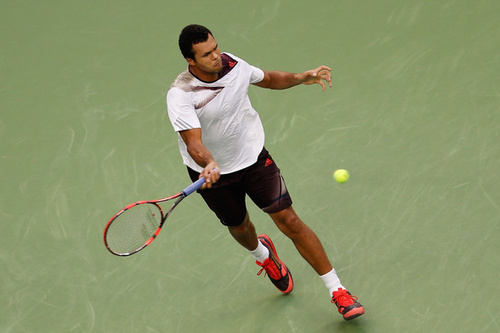Don't miss any stories → Follow Tennis View
FollowCan New Coaches Help Jo-Wilfried Tsonga Turn a Corner?
After a surprising second-round loss to Japan’s Kei Nishikori at the Masters 1000 tournament in Paris, Jo-Wilfried Tsonga will miss out on a spot in the Barclays ATP World Tour Finals. But his playing future is bright after the Frenchman appointed fellow countrymen Nicolas Escude and Thierry Ascione as his dual coaching team.

Tsonga’s former coach, Roger Rasheed, may have reason to feel marginally aggrieved with Tsonga’s decision. He assisted the Frenchman in reaching the quarterfinals of the Australian Open and semifinals at Roland Garros. Tsonga also has suffered a cruel string of injuries since Roland Garros that have hampered his year. But, with only the one title this year coming at Marseille in February, Tsonga may feel that he let a golden opportunity slip to capitalize on the momentum he gained after a stellar 2012 campaign, which raised him to his career-high ranking of world No. 5.
It is not hard to understand the reasoning behind the dual appointment of the Frenchman’s new coach. While Escude earned a reputation as a resilient serve-volleyers, Ascione became known as a flamboyant baseliner, so their expertise neatly balances the two key areas of the game. During his time in the French Davis Cup team, Tsonga created a close relationship with Escude, the team’s captain. The two men also serve as part-time coaches for Nicolas Mahut, another Frenchman perhaps best known for playing the longest match in tennis history against John Isner at Wimbledon in 2011. Under the guidance of Escude and Ascione, Mahut has experienced undoubtedly one of his best years on the tour in 2013, winning his first two career titles at s-Hertogenbosch and Newport while racking up 16 main-draw singles wins since June.
The appointment of Escude and Ascione proves that Tsonga continues to look for a team that will assist him in bridging the gap from being a good player to being a great one. There is no doubt that the Frenchman will feel more comfortable under the guidance of former professional circuit players who spent time with Tsonga in his developmental years. There is also no discounting the fact that French players in general have a distinctive style of play, and thus guidance from former French players who understand Tsonga’s playing style will help his overall game.
On the other hand, some doubts persist that this particular dual team of Escude and Ascione will help Tsonga progress into the top five. It is often said of a player that flamboyancy and mental agility can be taught to a conservative player, whereas it is much harder teaching conservatism and consistency to an already flamboyant player. Tsonga’s two new coaches shared his tendency for flamboyance during their playing days, so they may not be ideally suited to address the issues with erratic form that have prevented him from becoming a regular member of the elite.
Although Mahut is a relatively conventional serve-and-volleyer, his mental strength and his cohesive game make him an all-round solid player. Therefore, Mahut’s game perhaps has allowed for coaching that injected a more flamboyant approach, and this approach earned him arguably the biggest win of his career over Andy Murray earlier this year.
With respect to Tsonga, Escude and Ascione have a much tougher job to do. Tsonga’s game is as flamboyant as any other in the ATP top 20, but it is his mental fragility and his ability to stay in points that ultimately costs him deeper runs in key tournaments. They are the two men charged with the task of refining Tsonga as a consistent finalist at majors.
While Tsonga will be disappointed at missing the year-end championships, it is perhaps a blessing in disguise as he looks toward a brighter new year and adjusts to a new team. If the Frenchman stays fit, it is easy to see him reaching the final weekend of each major moving forward.










